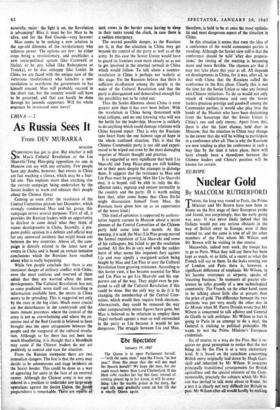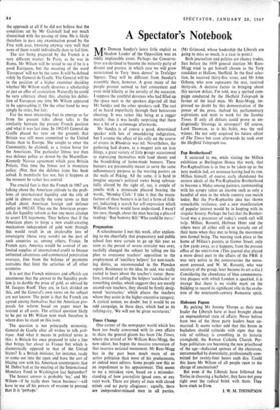Nuclear Gold
EUROPE
By MALCOLM RUTHERFORD
MAKING the long way round to Paris, the Prime I Minister and Mr Brown have now been to Rome on the first stage of their European probe and found, not surprisingly, that the early going was easy. It was never likely indeed that the Italians would put any serious obstacle in the way of British entry to Europe, even if they wanted to, and the same is true of all the other members of the Five whom Mr Wilson and Mr Brown will be visiting in due course.
Meanwhile, indeed next week, the troupe has to go to Paris. What they will say there has been kept as much, or as little, of a secret as what the French will say to them. In the leaks coming out of London and Paris there is, however, a significant difference of emphasis. Mr Wilson, in his laconic utterances at airports, speaks of 'meaning business.' In moments of greater elo- quence he talks grandly of a new technological community. The French, on the other hand, seem to be talking about little else at present than the price of gold. The difference between the two positions was put very neatly the other day in Le Monde when M. Pierre Drouin wrote that Mr Wilson is concerned to talk affaires and General de Gaulle to talk politique. Mr Wilson in fact is going to Paris in an attempt to do a deal; the General is sticking to political principles. He wants to test the Prime Minister's European credentials.
So, of course, in a way do the Five. But it re- quires no great perception to notice that the test being set by the Five is at a very elementary level. It is based on the catechism concerning British entry originally laid down by Hugh Gait- skell and inherited by Mr Wilson. It concerns principally transitional arrangements for British agriculture and the special interests of the Com- monwealth, precisely the subjects which Mr Wil- son was invited to talk most about in Rome. As a test it is clearly not very difficult for Britain to pass. Mr Wilson-after all would hardly be making the approach at all if he did not believe that the conditions set by Mr Gaitskell had not much diminished with the passing of time. He is likely therefore to pass any examination posed by the Five with ease, knowing anyway very well that none of them would individually dare to fail him.
The test being prepared by the French is a very different matter. In Paris, as he was in Rome, Mr Wilson will be tested to see if he is a good European, but the meaning of the word 'European' will not be the same. It will be defined solely by General de Gaulle. The General will be in the position of a higher examiner deciding whether Mr Wilson really deserves a scholarship or just an offer of association. Naturally he could be very arbitrary about this, altering his defini- tion of European any time Mr Wilson appeared to be approaching it. On the other hand he may simply be strict, but fair.
For the most interesting fact to emerge so far from the present talks about talks is the similarity between the present French position and what it was last time. In 1962-63 General de Gaulle placed his veto on the grounds that Britain was still more committed to the United States than to Europe. She sought to enter the Community, he claimed, as a trojan horse for the Americans. The particular litmus test then was defence policy as shown by the Macmillan- Kennedy Nassau agreement which gave Britain Polaris. This time the litmus test is monetary policy. (Not that the defence issue has been solved. It manifestly has not, but it happens at the moment be rather less central.
The crucial fact is that the French in 1967 are talking about the American attitude to the prob- lems of international liquidity and the role of gold in almost exactly the same terms as they talked about American foreign and defence policy in 1962-63. They see the American propo- sals for liquidity reform as but one more attempt to assert US hegemony. They believe that if the American plans to forge a new credit-creating mechanism independent of gold went through this would result in an intolerable loss of sovereignty (those very words) on the part of such countries as, among others, France. In French eyes, America would be assured of un- limited supplies of international credit to finance unlimited adventures and commercial penetration overseas, free from the balance of payments restraints that limit the activities of all other countries.
It is not that French ministers and officials are unanimous that the answer to the liquidity prob- lem is to double the price of gold, as advised by M. Jacques Rueff. They are, in fact, divided on this, and the General's own views on the subject are not known. The point is that the French are agreed among themselves that the American pro- posals for reform based on paper must be resisted at all costs. The critical question likely to be put to Mr Wilson next week therefore is where does he stand on this issue.
The question is not principally economic. General de Gaulle after all wishes to talk poll- tique. And what it means in political terms is this : is Britain for once prepared to take a line that brings her closer to France but which is diametrically opposed to that of the United States? Is a British minister, for instance, ready to come out into the open and have the sort of blazing row with his American counterparts that M. Debre had at the meeting of the International Monetary Fund in Washington last September?
The honest answer is probably 'no,' and Mr Wilson—if he really does 'mean business'—will have to use all his powers of evasion to pretend that it is 'perhaps.'



































 Previous page
Previous page